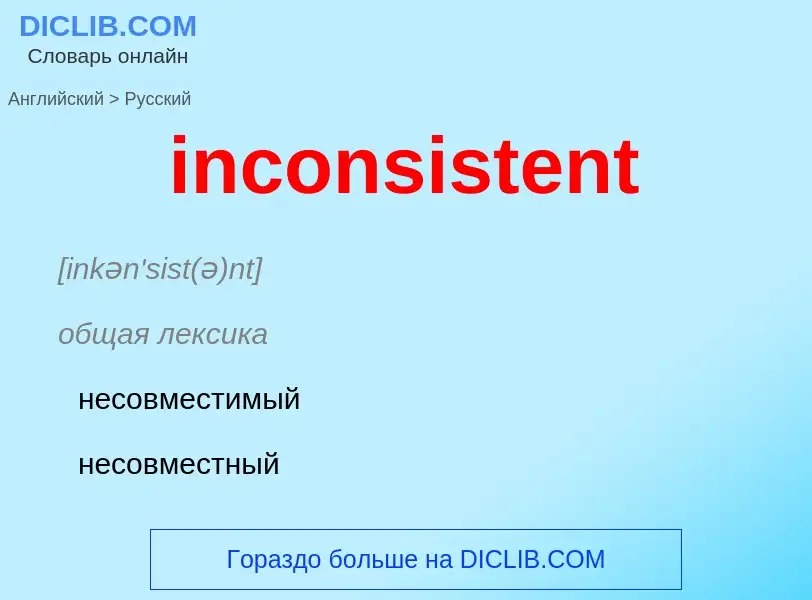Translation and analysis of words by ChatGPT artificial intelligence
On this page you can get a detailed analysis of a word or phrase, produced by the best artificial intelligence technology to date:
- how the word is used
- frequency of use
- it is used more often in oral or written speech
- word translation options
- usage examples (several phrases with translation)
- etymology
inconsistent - translation to russian
[inkən'sist(ə)nt]
общая лексика
несовместимый
несовместный
несоответствующий
несостоятельный
неустойчивый
противоречивый
сбивчивый
прилагательное
общая лексика
несовместимый
не соответствующий
противоречащий чему-л.
непоследовательный
противоречивый
неустойчивый
изменчивый
несовместимый, несообразный
непоследовательный, противоречивый
синоним
2) мат. Несовместный
Definition
Wikipedia
In classical deductive logic, a consistent theory is one that does not lead to a logical contradiction. The lack of contradiction can be defined in either semantic or syntactic terms. The semantic definition states that a theory is consistent if it has a model, i.e., there exists an interpretation under which all formulas in the theory are true. This is the sense used in traditional Aristotelian logic, although in contemporary mathematical logic the term satisfiable is used instead. The syntactic definition states a theory is consistent if there is no formula such that both and its negation are elements of the set of consequences of . Let be a set of closed sentences (informally "axioms") and the set of closed sentences provable from under some (specified, possibly implicitly) formal deductive system. The set of axioms is consistent when for no formula .
If there exists a deductive system for which these semantic and syntactic definitions are equivalent for any theory formulated in a particular deductive logic, the logic is called complete. The completeness of the sentential calculus was proved by Paul Bernays in 1918 and Emil Post in 1921, while the completeness of predicate calculus was proved by Kurt Gödel in 1930, and consistency proofs for arithmetics restricted with respect to the induction axiom schema were proved by Ackermann (1924), von Neumann (1927) and Herbrand (1931). Stronger logics, such as second-order logic, are not complete.
A consistency proof is a mathematical proof that a particular theory is consistent. The early development of mathematical proof theory was driven by the desire to provide finitary consistency proofs for all of mathematics as part of Hilbert's program. Hilbert's program was strongly impacted by the incompleteness theorems, which showed that sufficiently strong proof theories cannot prove their consistency (provided that they are consistent).
Although consistency can be proved using model theory, it is often done in a purely syntactical way, without any need to reference some model of the logic. The cut-elimination (or equivalently the normalization of the underlying calculus if there is one) implies the consistency of the calculus: since there is no cut-free proof of falsity, there is no contradiction in general.

